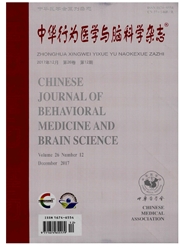

 中文摘要:
中文摘要:
目的探讨男性反社会人格障碍(Antisocial personality disorder,ASPD)患者决策倾向。方法将76例反社会人格障碍患者(ASPD)组与其人口学资料相匹配的无人格障碍健康对照(Healthy control,HC)组作为研究对象,通过爱荷华博弈任务(iowa Gambling Task,IGT)进行决策功能的测试,采用焦虑自评量表(SAS)、抑郁自评量表(SDS)、简明精神状态量表(MMSE)、明尼苏达多项人格测验精神病态分量表(MMPI—Pd)和Barratt冲动量表(BIS-11)对两组被试进行背景测试。结果ASPD组在IGT中净有利选牌数明显低于HG组[分别为(-4.13±18.27)次,(6.03±19.43)次],差异有统计学意义[t(134)=-3.132,P=0.002]。对ASPD组与HC组采用2(组)×5(阶段)方差分析,比较两组不同阶段的净有利选择,发现两组间的主效应显著[F(1.134)=9.811,P=0.002];不同阶段的主效应同样显著[F(4.536)=15.456,P〈0.01]。随着爱荷华博弈任务选择次数的增多,ASPD组和HC组净有利选择次数均逐渐增加,但在第三、第四、第五阶段,HC组相较ASPD组净有利选择数目显著增多[第三阶段F(1.134)=5.947,P=0.016;第四阶段F(1.134)=5.023,P=0.027;第五阶段F(1.134)=8.553,P=0.004]。ASPD组净有利选择数与MMPI—Pd分数呈负相关(r=-0.232,P=0.006),而与年龄、教育程度、SAS、SDS、BIS-11评分均无相关。结论男性反社会人格障碍患者存在决策功能障碍,其决策缺陷可能与眶额叶、背外侧前额叶以及前扣带回的结构和功能异常有关.
 英文摘要:
英文摘要:
Objective To investigate the capabilities of decision-making in male suhjects with Antisocial personality disorder (ASPD). Methods A total of 76 male ASPD subjects were compared with matched 60 healthy controls on the Iowa Gambling Task. At the same time, All of them were evaluated with Self- Rating Anxiety Scale (SAS), Self-Rating Depression Scale (SDS) , Mini-Mental State Examination (MMSE), the MMPI Personality Disorder Scales (MMPI-Pd) and The Barratt Impulsiveness Scale (BIS-II ). Results The ASPD group selected less advantageous cards ( the number of cards selected from the advantageous decks minus the number of cards selected from disadvantageous decks) than healthy controls ( ( - 4.13 ± 18.27 ) time, ( 6.03 ± 19.43 ) time respectively, t (134) = - 3.132, P = 0. 002). A 2 (group) x 5 (block) ANOVA ( analysis of variance) on the cards of net advantageous from the gambling task revealed a significant main effect of group (F(1 .134) = 9.811, P= 0.002 ). Meanwhile,the ANOVA revealed a significant main effect of block (F (4.536) = 15. 456, P 〈 0. 001 ). The results showed that healthy controls and ASPD group gradually shifted their selections toward the good decks as the game progresses. The study indicated the total number of advantageous cards for subjects with antisocial personality disorder were negative correlation to the MMPI-Pd( r= -0. 232, P= 0. 006). Conclusion The present study suggests that the decision-making impairment might be in the male subjects with antisocial personality disorder. The deficit of decision-making for ASPD might be attributed to the dysfunction of the orbitofrontal, dorsolateral frontal, and anterior cingulate cortex.
 同期刊论文项目
同期刊论文项目
 同项目期刊论文
同项目期刊论文
 Dissociation of decision making under ambiguity and decision makingunder risk: A neurocognitive endo
Dissociation of decision making under ambiguity and decision makingunder risk: A neurocognitive endo Selective impairment of attention networks in breast cancer patients receiving chemotherapy treatmen
Selective impairment of attention networks in breast cancer patients receiving chemotherapy treatmen Dissociation of decision making under ambiguity and decision making under risk: A neurocognitive end
Dissociation of decision making under ambiguity and decision making under risk: A neurocognitive end Trait-related decision making impairment in obsessivecompulsive disorder: evidence from decision mak
Trait-related decision making impairment in obsessivecompulsive disorder: evidence from decision mak Dissociation of Neural Substrates of Response Inhibitionto Negative Information between Implicit and
Dissociation of Neural Substrates of Response Inhibitionto Negative Information between Implicit and Selective impairment of attention networks in breast cancerpatients receiving chemotherapy treatment
Selective impairment of attention networks in breast cancerpatients receiving chemotherapy treatment Modul- ation of interhemispheric functional coordination in electroconvulsive therapy for depression
Modul- ation of interhemispheric functional coordination in electroconvulsive therapy for depression 期刊信息
期刊信息
